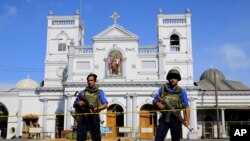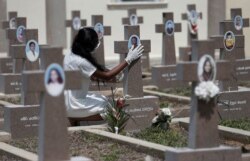Three Sri Lankan nationals are facing charges in the U.S. for supporting an Islamic State cell responsible for the 2019 Easter attacks in Sri Lanka that killed 268 people, including five U.S. citizens.
Mohamed Naufar, Mohamed Anwar Mohamed Riskan and Ahamed Milhan Hayathu Moahmed were charged last month in federal court in the U.S. city of Los Angeles, according to a Justice Department statement issued Friday.
The three men were affiliated with a militant group in Sri Lanka that supported the Islamic State (IS) terror group, also known as ISIS. The local group, called ISIS in Sri Lanka, has been blamed for a coordinated series of suicide bombings at Christian churches and hotels in three Sri Lankan cities on April 21, 2019, U.S. prosecutors said.
“According to these charges, the defendants were committed supporters of ISIS, recruited others to ISIS’s violent cause, purchased materials for and made IEDs [improvised explosive devices], helped to prepare and trained others who participated in the attacks, and murdered in the name of this deadly foreign terrorist organization,” John C. Demers, an assistant attorney general who leads the Justice Department’s National Security Division, said in a statement.
Naufar, known as the second emir for the IS cell in Sri Lanka, allegedly led the group’s propaganda efforts, recruited others to join IS and led military-type training, according to an FBI criminal complaint. Riskan allegedly helped manufacture the IEDs used in the Easter attacks, while Hayathu Moahmed allegedly executed a police officer in order to obtain firearms, shot a suspected informant, and scouted a location for a separate terrorist attack, the complaint added.
All three defendants are being held by authorities in Sri Lanka.
Colin Clarke, a senior research fellow at the Soufan Center in New York, says it’s not clear whether these individuals will be brought to the U.S. for trial and whether the government of Sri Lanka would agree to send them.
“It is entirely possible that U.S. law enforcement agencies will pursue similar cases against foreign nationals responsible for terror attacks against U.S. citizens,” he told VOA. “These cases can be important symbolically, to show that the United States will pursue justice for its citizens no matter what.”
U.S. officials said they support efforts by their Sri Lankan counterparts to make sure the three suspects will stand trial.
“This case clearly demonstrates that the United States will take decisive action to ensure terrorists face justice when they target Americans anywhere in the world,” said Nick Hanna, the U.S. attorney for the Central District of California.
“The United States remains confident in the Sri Lankan authorities’ ability to bring the perpetrators to justice – and this complaint makes clear that we stand ready with these charges in the event the defendants attempt to evade justice,” he added in a statement.
Other experts say the U.S. government has shown its determination to follow through with extraditing foreign terrorists charged with killing Americans and inciting attacks against the West.
“The recent extradition of Sheikh Abdullah al-Faisal from Jamaica to the U.S. is a recent example of the federal government’s resolve to prosecute international terrorists,” said Daryl Johnson, a former senior terrorism analyst at the U.S. Department of Homeland Security.
Al-Faisal, a radical Muslim cleric accused of recruiting sympathizers and potential IS fighters, was extradited to the U.S. in August 2020.
In 2017, the U.S. Department of the Treasury named him a “specially designated global terrorist.”





